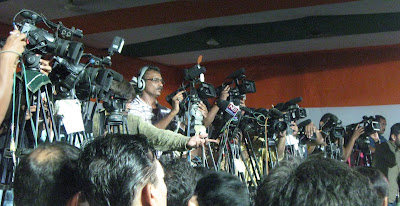Santanu Dasgupta
By early afternoon, the air had turned hot even in November. I wearily bid farewell to my last guest of the day – the day of our house-warming in Trivandrum
Children promptly started playing in the open ground in front of the house. The gates were yet to be fixed and it made their work of fetching the ball from our compound that much easier. My wife and I sat on the floor of our new house, fondly admiring the glitter all around …
‘Bring me my share of food’, a voice boomed from the court-yard. Startled, we went out to find an old woman squatting on the yard. She had tied her hair in a bundled knot. Even in tattered clothes, she had an air of authority about her. A dusty sling-bag was her only possession, a garland of dried flowers hung loosely around her neck.
Children playing outside ran in to shoo her away. (It was not their fault: that’s what we had taught them all along – don’t trust strangers, don’t allow trespassers, and so on …). I dissuaded them and asked the new guest to come under the shade of our portico. After all, with all her rags and dust she still was a guest on that auspicious day. I served her food on a platter and politely bowed to request her to have it and bless our new home.
At once, tears welled up in her eyes. She had a hasty meal with tears still streaming down. I stood in silence.
As she finished her meal, she muttered something to herself that I believe was a good-wish in Tamil. And then, she dug deep into her sling-bag to fetch out a broken comb, a handful of peanuts, some rags, and finally a very well-dried coconut. The coconut was by far the best thing that she had in her possession.
When she offered me her gift of the dried coconut, someone in me had already started to recite Tagore’s poem Kripon (The Miser). [A beggar once met a King. Strangely, the King, instead of giving the beggar anything, begged to have something from him. Surprised, the beggar offered him just a grain of rice from his rag bundle. After returning home, he found that one grain in the bundle had turned into gold].
But here was my “King” who had given me, in return for my gift of just a few morsels of food, the best of all that was there in her possession!
After uttering a few more blessings, she broke into a light laugh and trotted away gaily, the garland swinging on her neck like a flag of timeless benevolence.








